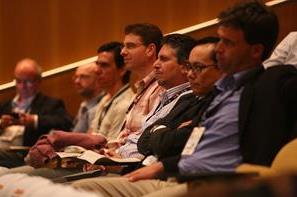Publicado em 14 de março de 2014
Sobratema Workshop 2014: Planning may reduce logistic risks in works
Better application of resources, materials and labor and increase of productivity are other benefits that come out from planning

During the last years, Brazilian civil construction is going through transformations due to the enlargement of building works and to the investments turned to reduce the existing bottlenecks in the infrastructure of transport, power and sanitation. Materials of better quality, differentiated models of construction, equipment with high on-board technologies contributed to make this industry more efficient in questions related to productivity, sustainability and competitiveness.
However, from the point of view of professor Hélio Flavio Vieira—from the Department of Civil Engineering of FURB - Fundação Universidade Regional de Blumenau—it will be difficult to reach a level of excellence if the market of civil construction does not understand the importance of logistic planning when carrying out a work. “Logistics is responsible by the strategic management of material, service and labor flow and of associated information. Its purpose is to maximize productivity and service level”, defines him.
Without an efficient logistic planning—that has to be carried out before the start of the works and has to include all factors involved with their execution, from external market to the worksite—some risks may become more imminent, such as, for example, discontinuity of production caused by lack of labor and/or materials, use of inappropriate equipment, lack of a maintenance policy and necessity of reworking. “That is why undoubtedly the less-developed logistic is the main cause pointed to justify the inefficient productivity”, says Vieira, that will be one of the talkers of the Sobratema Workshop 2014, to be carried out in April 8 in São Paulo, whose main approach is Risk Management in Worksites – Challenges and Solutions.
According to the professor of FURB, the lack of resources in the worksite may even lead to delays in the work schedules that may result in penalties, improvisation and extra financial expenses that will interfere in the contractor’s competitiveness. “These risks may be reduced or even eliminated if the preliminary logistic planning of the work is thoroughly developed,” explains him. “In Brazil, planning is developed in two or three months and works are carried out in two or three years. In Japan, works are planned during a year and carried out during six months. That is why planning is the word,” ends him.
Besides Vieira, the Sobratema Workshop 2014 will have three more lectures. The lecture about environmental risks will be presented by Marco Martins, consultant of Proam – Brazilian Institute of Environmental Protection, and the lecture about accidents and their impacts will be presented by Cosmo Palásio de Moraes Jr., state director of SINTESP – Union of Work Safety Technicians in the State of São Paulo. There will be also a lecture about risk evaluation and insurance in worksites, including the subjects to be considered when developing the matrix of risks in worksites. At the end, all talkers will take part in a debate, to be coordinated by Eurimilson Daniel, vice-president of Sobratema.
Sobratema Workshop 2014 is directed to businessmen, managers, engineers, professionals and experts of construction contractors, insurance companies, design consultants and technicians of government departments. It will be a unique opportunity to improve the knowledge in the area of risk management.
Service:
Sobratema Workshop 2014
Theme: Risk Management in Worksites – Challenges and Solutions
Date: April 08, 2014
Hour: 13h00 to 18h30 (1:00 to 6:00 PM)
Address: Centro Brasileiro Britânico – Rua Ferreira de Araújo, 741 – Pinheiros – São Paulo – SP
Applications: http://www.sobratemaworkshop.com.br
Av. Francisco Matarazzo, 404 Cj. 701/703 Água Branca - CEP 05001-000 São Paulo/SP
Telefone (11) 3662-4159
© Sobratema. A reprodução do conteúdo total ou parcial é autorizada, desde que citada a fonte. Política de privacidade


